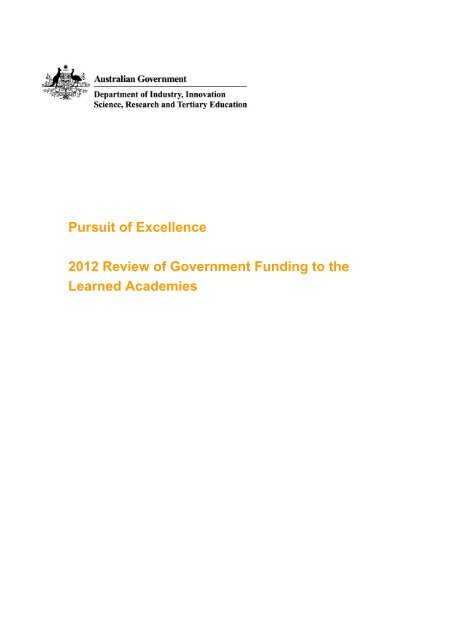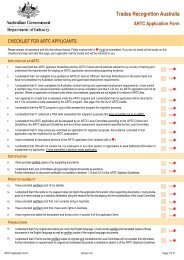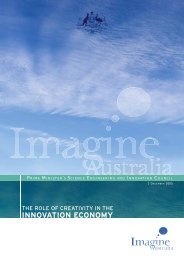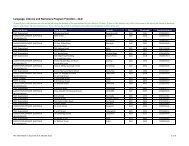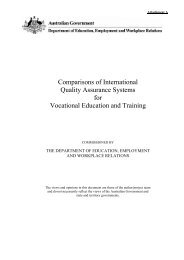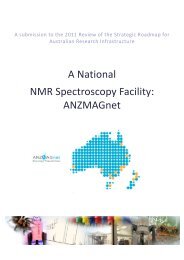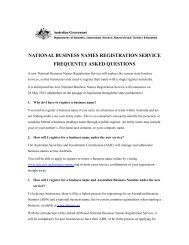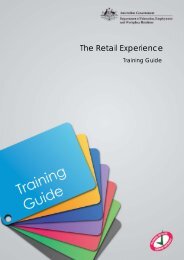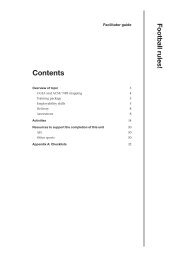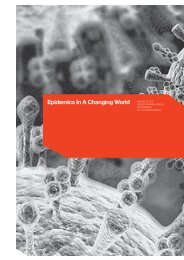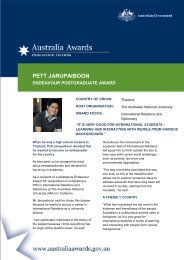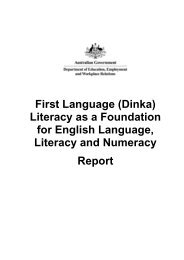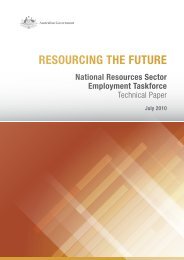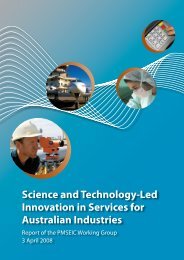Executive Summary: Pursuit of Excellence - Department of ...
Executive Summary: Pursuit of Excellence - Department of ...
Executive Summary: Pursuit of Excellence - Department of ...
You also want an ePaper? Increase the reach of your titles
YUMPU automatically turns print PDFs into web optimized ePapers that Google loves.
<strong>Pursuit</strong> <strong>of</strong> <strong>Excellence</strong><br />
2012 Review <strong>of</strong> Government Funding to the<br />
Learned Academies
© Commonwealth <strong>of</strong> Australia 2012<br />
This work is copyright. Apart from any use as permitted under the Copyright Act 1968, no<br />
part may be reproduced by any process without prior written permission from the<br />
Commonwealth. Requests and inquiries concerning reproduction and rights should be<br />
addressed to the Commonwealth Copyright Administration, Attorney General’s <strong>Department</strong>,<br />
Robert Garran Offices, National Circuit, Canberra ACT 2600 or posted at<br />
www.ag.gov.au/cca
<strong>Executive</strong> <strong>Summary</strong><br />
The Learned Academies are important national assets which provide a unique and<br />
valuable contribution to the pursuit <strong>of</strong> excellence in Australia’s innovation system and<br />
in the provision <strong>of</strong> advice to government on issues <strong>of</strong> national and international<br />
significance. They play a distinctive role in promoting and fostering research and<br />
scholarship in all disciplines, enabling innovation. While each academy is different in<br />
scale (in level <strong>of</strong> funding and in the disciplines it represents), nonetheless they share<br />
many common goals, including representing their disciplines; recognising the<br />
preeminent scholars in their fields through the election <strong>of</strong> Fellows; contributing to the<br />
broader policy debate; exploring issues <strong>of</strong> national and international importance and<br />
collaborating internationally within their disciplines.<br />
The Learned Academies and Australian Council <strong>of</strong> Learned Academies (ACOLA) are<br />
provided with Australian Government funding to support activities to foster<br />
understanding <strong>of</strong> the importance <strong>of</strong>, or promote research and scholarship in, science,<br />
technology, social science and/or humanities in Australia.<br />
This review <strong>of</strong> Australian Government funding to the Learned Academies and<br />
ACOLA under Higher Education Support Act 2003 – Higher Education Research<br />
Promotion (HESA-HERP) and Learned Academies – Supplementation covers the<br />
period 1 January 2006 to 31 December 2010.<br />
Funding to the Learned Academies is regularly reviewed, the last review being held<br />
in 2005. The scope <strong>of</strong> these reviews has varied over the years. In 2005, the review<br />
scope was wider than the current review and looked at the role and effectiveness <strong>of</strong><br />
the Learned Academies and National Academies Forum (now ACOLA). The 2005<br />
Review recommended major strengthening <strong>of</strong> the role and activities <strong>of</strong> the Learned<br />
Academies and led to a substantial increase in funding, through Learned Academies<br />
- Supplementation, for their core operations. This review, the 2012 review, is a<br />
standard evaluation <strong>of</strong> an ongoing government program. It is not a review <strong>of</strong> the<br />
performance <strong>of</strong> either the Learned Academies or ACOLA.<br />
The current 2012 review has assessed expenditure <strong>of</strong> HESA-HERP and Learned<br />
Academies - Supplementation against the <strong>Department</strong> <strong>of</strong> Finance and Deregulation’s<br />
expenditure review principles and finds in summary:<br />
Appropriateness — the Learned Academies have provided improved access to<br />
information due to the knowledge, research and scholarship <strong>of</strong> their members. It was<br />
therefore appropriate to use public funds to support them as they provided an<br />
important national public good as well as contributing to the achievement <strong>of</strong> social<br />
inclusion objectives. The national innovation system is underpinned by Australia’s<br />
capacity to undertake high quality research that addresses national challenges and<br />
opens up new opportunities. The Learned Academies bridge all disciplines and play<br />
a critical role in fostering excellence in research and in contributing to public policy<br />
debates on issues <strong>of</strong> national importance.
Effectiveness — the objective <strong>of</strong> the Higher Education Research Promotion (HERP)<br />
and Supplementation funding is to foster understanding <strong>of</strong> the importance <strong>of</strong>, or<br />
promote research and scholarship in, any discipline. The Learned Academies have<br />
effectively met this objective through both their domestic and international activities,<br />
including through hosting fora, providing advice to government reviews, supporting<br />
researchers and publishing major expert reports on a wide range <strong>of</strong> issues. Specific<br />
advantages <strong>of</strong> the Learned Academy include low overheads, the voluntary nature <strong>of</strong><br />
the work provided by Fellows, the breadth <strong>of</strong> skills and expertise, and the alignment<br />
<strong>of</strong> the Learned Academies to the national policy and the science research and<br />
innovation system. Moreover, as the Learned Academies have the capacity to tap<br />
into the breadth <strong>of</strong> skills and expertise <strong>of</strong> Fellows and to marshal contributions<br />
(including voluntary contributions) from their networks <strong>of</strong> researchers, other<br />
stakeholders and international connections, the grants they receive can leverage<br />
significant resources that help deliver the government’s policy objectives.<br />
Efficiency — the Learned Academies vary in terms <strong>of</strong> their size, their level <strong>of</strong><br />
funding, their structure and their administrative arrangements. The review found that<br />
the Learned Academies and ACOLA had used the increased HERP support and<br />
Supplementation funding, flowing from the 2005 review, to boost the capacity <strong>of</strong> their<br />
organisations to contribute independent, expert, evidence-based advice to inform<br />
policy debates and deliver international activities. The increased funding has not<br />
acted as a disincentive for the Learned Academies to engage with the government<br />
through other programs. The Learned Academies continue to receive income from a<br />
range <strong>of</strong> government and non-government sources and are highly effective in<br />
leveraging the HERP funding.<br />
Integration — HERP funding provides certainty which underpins the Learned<br />
Academies’ core functions and enables them to seek project specific funding from<br />
other sources to pursue strategic objectives. HERP funding acts as an enabler for the<br />
Learned Academies to successfully apply for funding from other government<br />
programs to deliver additional activities that complement the overall HERP objectives<br />
and government priorities.<br />
Performance assessment — The Learned Academies met all reporting and<br />
compliance requirements for HERP funding, the review noted however that the<br />
conditions <strong>of</strong> grant under HESA-HERP do not currently include specific performance<br />
measures, nor do they specify the format or direct content for annual reporting. As a<br />
result there is considerable variation in the style and content <strong>of</strong> the Learned<br />
Academies’ annual reports. To be consistent with better practice grant administration,<br />
there is merit in the government working with the Learned Academies and ACOLA to<br />
develop a consistent annual reporting process to assist in performance assessment<br />
and accountability purposes.<br />
Strategic policy alignment — the Learned Academies and ACOLA play a unique<br />
and critical role in promoting and fostering excellence in research which underpins
the national innovation system. The Learned Academies are also uniquely placed to<br />
continue to provide independent, evidence-based advice to government and thereby<br />
contribute to a broad range <strong>of</strong> the government’s strategic longer term policy priorities.
<strong>Summary</strong> <strong>of</strong> recommendations<br />
In the context <strong>of</strong> HESA-HERP and Learned Academies - Supplementation, the<br />
review panel made the following recommendations regarding key issues for the<br />
Learned Academies, ACOLA and the government to take forward:<br />
1. The government continue to provide ongoing support to the Learned<br />
Academies and ACOLA to enable them to foster understanding <strong>of</strong> the<br />
importance <strong>of</strong>, and/or promote research and scholarship in, science, social<br />
science or the humanities in Australia for the national benefit.<br />
2. The government consider options to enhance the strategic role <strong>of</strong> the Learned<br />
Academies and ACOLA in providing the Australian Government with<br />
independent, evidence-based advice on issues <strong>of</strong> national importance.<br />
3. The Learned Academies and ACOLA meet individually with senior <strong>of</strong>ficials (at<br />
least twice a year) to exchange views on strategic priorities and emerging<br />
issues <strong>of</strong> national importance.<br />
4. The Learned Academies maintain their strong connections with stakeholders,<br />
including the public sector, industry, non-government organisations and<br />
international organisations.<br />
5. The Learned Academies continue to make efforts to communicate their<br />
capabilities and activities which advise the community <strong>of</strong> the issues on which<br />
they can provide independent advice.<br />
6. Within available resources, the Learned Academies maximise their domestic<br />
and international activities to enhance collaboration opportunities within and<br />
across disciplines.<br />
7. The Learned Academies continue to encourage the promotion <strong>of</strong> early and<br />
mid-career researchers, including in new and emerging fields; and continue to<br />
engage with researchers in under represented disciplines or groups, including<br />
women and Indigenous researchers.<br />
8. The Learned Academies should share experiences to continually improve their<br />
practices and procedures.<br />
9. The government work with the Learned Academies and ACOLA to streamline<br />
reporting requirements, including consideration <strong>of</strong> relevant performance<br />
indicators.<br />
10. Government support for ACOLA should continue to focus on managing and<br />
maintaining appropriate inter- and extra-academy communication linkages and<br />
encourage collaboration between the Learned Academies.


